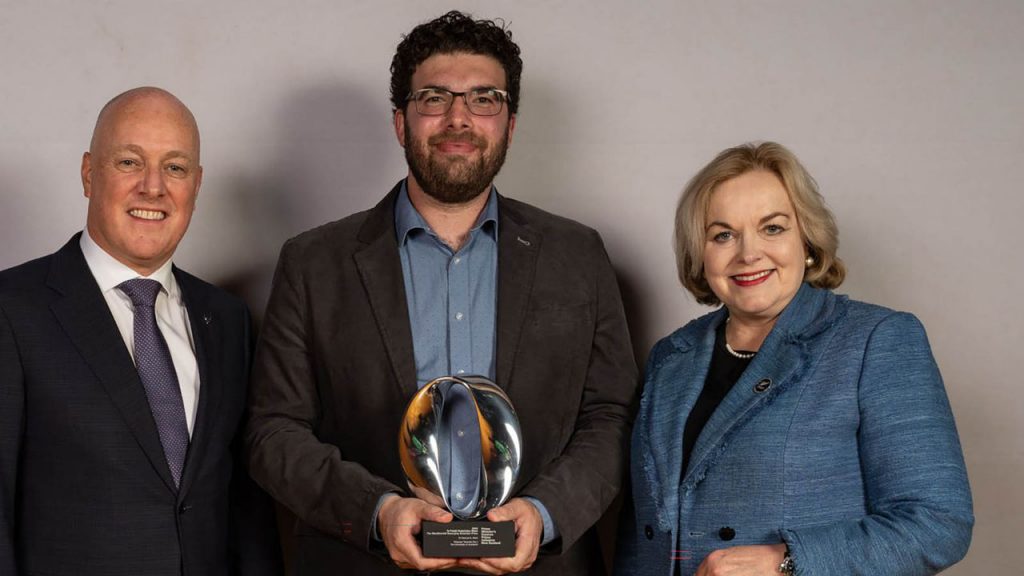Science
Cognitive Scientist Urges Reform to Prevent Brain Drain in New Zealand

Cognitive scientist Samuel Mehr, who won New Zealand’s prestigious science prize last year, has issued a stark warning regarding the country’s scientific future. He claims that unless the “laughably pathetic” funding system for science undergoes significant reform, the nation risks losing its brightest minds to overseas opportunities.
In a recent statement, Mehr highlighted the detrimental impact of the current financial landscape on innovation in New Zealand. He pointed out that over the past 10 years, the country has seen a decline in its reputation as a hub for scientific advancement. This decline, he argues, has been exacerbated by recent restructures and funding cuts, which he described as adding “insult to injury.”
Concerns Over Funding and Innovation
The cognitive scientist’s comments come at a time of heightened concern among researchers and academics regarding the state of science funding in New Zealand. Many believe that the financial support provided for scientific research is insufficient to sustain high-quality projects and attract top talent.
Mehr stated that New Zealand once stood proudly as a leader in research and innovation, but that status has now been compromised. “We have lost our competitive edge,” he said, emphasizing that without immediate changes to the funding model, the country will continue to see an exodus of talented researchers seeking better opportunities abroad.
The scientist’s frustration is echoed by numerous colleagues in the field who have experienced the challenges posed by limited resources. Many have witnessed their peers leave for countries that offer more robust support for scientific endeavors. This trend not only threatens the growth of New Zealand’s research community but also undermines its potential contributions to global scientific developments.
The Need for Systematic Change
According to Mehr, the current budgetary allocations for science fall drastically short, impacting both the quality of research and the ability to attract and retain skilled professionals. He described the existing system as “inadequate,” calling for a comprehensive review of how funds are distributed within the scientific sector.
As New Zealand grapples with these issues, policymakers are under increasing pressure to address the concerns raised by experts like Mehr. His call for a restructured funding approach could serve as a pivotal moment for the country’s scientific landscape.
The implications of this brain drain extend beyond academia. A decline in innovation can have far-reaching effects on the economy and society, limiting advancements in critical sectors such as healthcare, technology, and environmental science.
As discussions about the future of science funding in New Zealand continue, the urgency for reform becomes increasingly clear. The next steps taken by decision-makers will be crucial in determining the nation’s ability to retain its top scientific talent and restore its reputation as a global leader in research and innovation.
In conclusion, Samuel Mehr has raised a critical alarm regarding the future of science in New Zealand. Without substantial changes to the funding system, the potential for a significant brain drain looms large, threatening not just the scientific community but the broader fabric of innovation within the country.
-

 World3 months ago
World3 months agoTest Your Knowledge: Take the Herald’s Afternoon Quiz Today
-

 Sports3 months ago
Sports3 months agoPM Faces Backlash from Fans During Netball Trophy Ceremony
-

 Lifestyle3 months ago
Lifestyle3 months agoDunedin Designers Win Top Award at Hokonui Fashion Event
-

 Sports3 months ago
Sports3 months agoLiam Lawson Launches New Era for Racing Bulls with Strong Start
-

 Lifestyle3 months ago
Lifestyle3 months agoDisney Fan Reveals Dress Code Tips for Park Visitors
-

 Health3 months ago
Health3 months agoWalking Faster Offers Major Health Benefits for Older Adults
-

 World3 months ago
World3 months agoCoalition Forms to Preserve Māori Wards in Hawke’s Bay
-

 Politics3 months ago
Politics3 months agoScots Rally with Humor and Music to Protest Trump’s Visit
-

 Top Stories3 months ago
Top Stories3 months agoUK and India Finalize Trade Deal to Boost Economic Ties
-

 Entertainment3 months ago
Entertainment3 months agoExperience the Excitement of ‘Chief of War’ in Oʻahu
-

 World3 months ago
World3 months agoHuntly Begins Water Pipe Flushing to Resolve Brown Water Issue
-

 Science3 months ago
Science3 months agoNew Interactive Map Reveals Wairarapa Valley’s Geological Secrets









